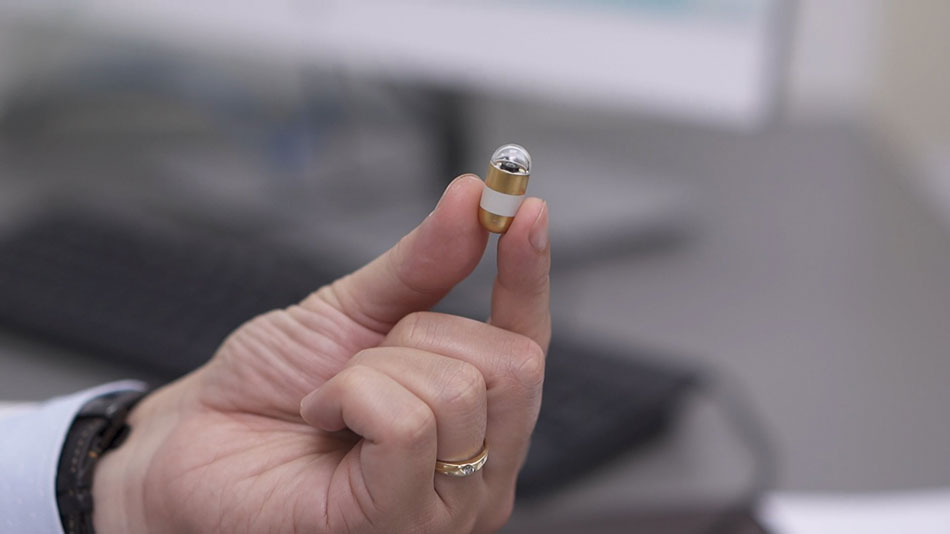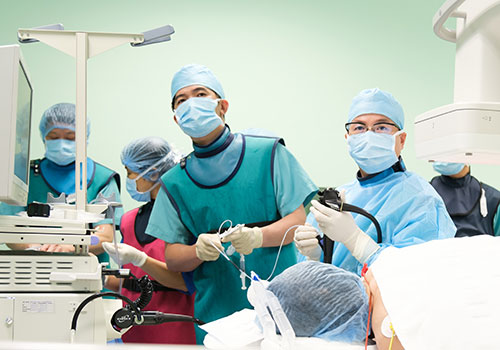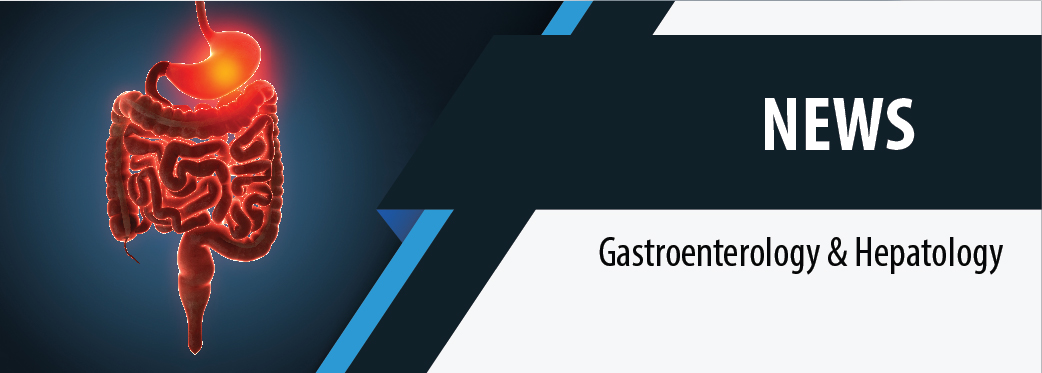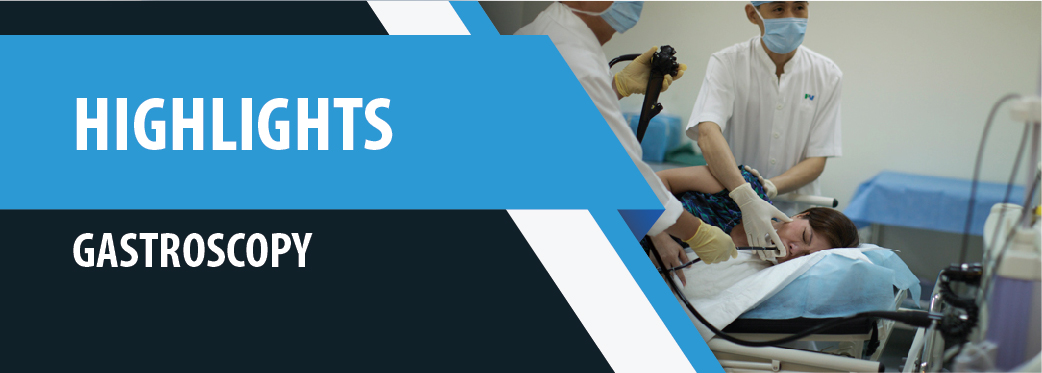
With the combination of a highly skilled staff, modern equipment and strictly controlled protocols, the FVH Department of Gastroenterology & Hepatology can diagnose and treat most known diseases of the digestive and liver-biliary system. And, do so by providing world-class service at an acceptable cost.
FV Hospital places emphasis on personal attention to each patient, making them feel relaxed, whilst they receive treatment targeted to address their specific needs. Each step of the way, the friendly team at FVH will help you to understand the details of your treatment.
We focus on your comfort, whilst simultaneously providing the best quality treatment to ensure excellent results. This compassion extends through to the necessary follow-up care to ensure a smooth recovery.
Procedures
At FVH, we follow the most vigorous criteria of disinfection, to assure the patient’s safety. All equipment and implements are reprocessed automatically, according to the stringent standards of European protocols.
To build the very best relationship between doctor and patient, the doctor in charge will take care of the patient at every stage of the process: consultation, diagnosis, endoscopy, hospitalization and later follow-up.

Endoscopy
Gastroenterologists often use a medical procedure called endoscopy to diagnose or treat various conditions such as ulcers, polyps or even cancers. The endoscopy allows our doctors to see inside the digestive tract and organs located next to the digestive tract. They can examine it carefully, and take biopsies (samples of mucosa) to further study the nature of the problem. Endoscopy is performed under a local or general anaesthesia.
Endoscopic procedures follow three methods:
- Gastroscopy
- Colonoscopy
- Rectoscopy / Anuscopy
- Capsule endoscopy
- Endoscopic ultrasound (EUS)
Interventional Endoscopy
Interventional or therapeutic endoscopy, ERCP (Endoscopic Retrograde Cholangiopancreatography), EUS, and other techniques are the new modality of treatment, which can help to solve the problem with faster recovery and lower cost. These treatments can be used to eliminate an existing problem or to prevent a digestive tract problem occurring; especially for early gastrointestinal cancers. Endoscopic treatment can be applied in all parts of the gastro-intestinal tract and bilio-pancreatic system. Most commonly used techniques are dilation, haemostasis, stenting, and removal of foreign bodies, percutaneous endoscopic gastrostomy, pancreatic pseudo-cysts endoscopic drainage, pancreatitis treatment, etc.
Liver Biopsy
For liver diseases, correct diagnosis is crucial in determining the correct treatment. An advanced (specialized gun) is utilized to obtain the liver sample for biopsy. All results are analyzed and evaluated in accordance to international standards using the most recent available information. Treatment and follow-up for all such cases adhere to the same strict standards
Peptic ulcer – this can be either a sore or eroded area in the linings of the digestive tract. Peptic ulcers usually occur in the stomach (gastric ulcer) or in the duodenum (duodenal ulcer) which is the upper region of the small intestine.
GERD or Gastroesophagal Reflux Disease: when the valve between the oesophagus and stomach is damaged, acid from the stomach flows back (refluxes) into the oesophagus causing irritation and sometimes damage to the lining of the oesophagus. This condition is known as GERD. In some cases the reflux can rise high enough to affect the vocal cords, or even flow into the lungs (called aspiration), causing damage to those tissues and organs.
Pancreatic diseases
Gastro-intestinal infections – gastrointestinal disorders, including ulcers and to a lesser instance, cancer can be caused by a bacterial infection known as helicobacter pylori (H. pylori).
- Cancer of digestive system
- Paediatric gastroenterology
- Motility functions

FV Hospital has a fully-equipped specialized Hepatology Center. The center was opened in 2005 by our consulting specialist, Professor Patrice Cacoub, one of Europe’s leading hepatitis specialists. The FVH Hepatology Team possess the knowledge and expertise in advanced surgical procedures, as well as non-surgical alternatives, offering patients optimal results while minimizing discomfort and recovery time.
Hepatology conditions:
The Fibroscan
The procedure of examination and diagnosis of liver fibrosis by Fibroscan is like the echography with the result delivered in a few minutes. In some cases, Fibroscan can be applied in stead of liver biopsy or can assist doctors to make a next plan for diagnosis and treatment. Fibroscan itself can provide enough information for making a decision of treatment, without the need of liver biopsy. Moreover, thanks to its painlessness and harmlessness to health, it can be performed many times to monitor the liver fibrosis development and treatment effectiveness.
Capsule endoscopy
Capsule endoscopy is a procedure to examine the small intestine which is beyond the reach of a conventional endoscope. This technique is used to diagnose and monitor diseases throughout the gastrointestinal tract (GI). Although conventional endoscopy remains the standard to examine the oesophagus, stomach and distal colon, capsule endoscopy has the advantages that come with non-invasive procedures.
Capsule endoscopy is primarily used to look for small bowel bleeding in the small intestine, but it is also being used for the evaluation and diagnosis of celiac disease, Crohn’s disease, small bowel tumours, and intestinal disorders caused by non-steroidal anti-inflammatory drugs (NSAIDs), and other diseases related to oesophagus, stomach and large intestine. It is also used in monitoring treatment outcomes. The limitation of the current technique is that they cannot function for controlling, obtaining, or biopsies.
Manoscan
This is an Oesophageal Peristalsis Manometer, a technique that helps to observe your oesophageal function to evaluate if it’s functioning correctly. The technique is to measure the oesophagus contraction and coordination of the oesophageal muscles in the process of transporting food into your stomach. It’s used to diagnose whether you have a gastroesophageal reflux condition, or if it has been mistaken for other diseases. Thereby, the procedure helps doctors to provide timely and effective treatment methods.
The products is manufactured by Medtronic
Fibroscan Expert 630
This technique is a quantification of liver stiffness and fibrosis; liver fat; and spleen stiffness by an ultrasound-fusion device that is guided by a convex transducer providing images to a 19 inch display.
It is the latest and most advanced generation of Fibroscan.
24h pH measurement
The 24-hour oesophageal pH is a test used to evaluate the acid reflux level from the stomach into the oesophagus. The test is commonly used in the diagnosis and monitoring of gastroesophageal reflux. It is recommended for patients with suspected gastroesophageal reflux disease that cause symptoms such as heartburn, chest pain and persistent dry cough.
The evaluation of the effectiveness of the gastroesophageal reflux disease treatment.
Endoscopic ultrasound (EUS)
EUS is a method that allows doctors to examine the lining of the digestive tract, including the oesophagus, stomach, duodenum, and rectum. EUS is also used to study organs near the gastrointestinal tract including the lungs, liver, gallbladder, bile duct systems (including the pancreas), and lymph nodes.
This method uses an endoscope with integrated mini ultrasound transducers combined with high frequency sound waves to record ultrasound images with higher quality and accuracy as compared to conventional ultrasound methods on the outside of the body.
When it’s combined with a biopsy, the doctor can take samples from the patient’s tissue and fluids, minimalizing the invasive impact. Additionally, EUS is also used in treatment such as pseudocyst drainage, prophylactic pancreatic duct stenting, biliary drainage, celiac plexus block, bile-intestine surgery, and abdominal drainage
Dr Bui Nhuan Quy
Speciality: Gastroenterology & Hepatology
Language Spoken: Vietnamese, English
Special Interests:
- Gastric cancer early diagnosis
- Gastrointestinal endoscopy
- Endoscopic retrograde cholangiopancreatography (ERCP)
- Endoscopic ultrasound (EUS)
Dr Ngo Van Huy
Speciality: Gastro-enterology & Hepatology
Language Spoken: Vietnamese, English
Special Interests:
- Viral hepatitis
- Liver cancer
- Helicobacter pylori infection
Dr Huynh Anh Quoc
Speciality: Gastroenterology & Hepatology
Language Spoken: Vietnamese, English
Special Interests:
- Liver conditions
- Endoscopy
Dr Le Thi Thanh Truc
Speciality: Gastro – Enterology & Hepatology
Language Spoken: Vietnamese, English
Special Interests:
- Hepatitis (virus, alcohol, autoimmune, toxicity…), NAFLD (Non-alcoholic fatty liver disease), NASH (Non-Alcoholic SteatoHepatitis), Cirrhosis…
- Pancreatitis
- GERD, Gastritis, Peptic Ulcer, H. pylori infection
- Inflammatory bowel disease, IBS, Hemorrhoids
Dr Vu Duy Hien
Speciality: Gastroenterology & Hepatology
Language Spoken: Vietnamese, English
Special Interests:
- Helicobacter pylori infection
- Pancreatitis
- Gastro-oesophageal reflux disease (GERD)
Dr Nguyen Huu Nhan
Speciality: Gastro - Enterology & Hepatology
Language Spoken: Vietnamese, English
Special Interests:
- Early gastric and colorectal endoscopic detection and management with EMR and ESD techniques
- ERCP – endoscopic retrograde cholangiopancreatography
- H.pylori infection and other functional G.I diseases
- MAFLD – metabolic-associated fatty liver disease and other chronic liver diseases












